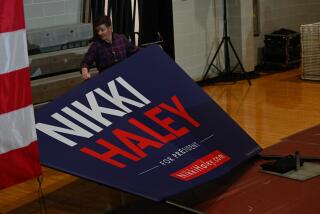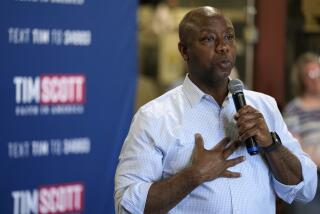GOP eager to show strength
ARLINGTON, VA. — If Virginia seems poised to make yet another political hairpin turn just one year after helping elect Barack Obama president, the reason might be found on Sally Linderman’s front lawn and Facebook page.
Linderman, 69, is typical of the newly energized Republican voters hellbent to make sure Robert F. McDonnell wins the race for governor Tuesday. She attended two rallies in the same week, has four signs stuck in her yard and even figured out how to post one on her Facebook page for the GOP candidate.
“We love McDonnell,” Linderman declared, peeking out her front door to talk about her favorite subject -- the first opportunity to ding President Obama in an election some see as a referendum on his early months in office.
McDonnell, the state’s former attorney general, holds a double-digit lead over state Sen. R. Creigh Deeds in what could spell the end of the Democrats’ reign in the Old Dominion. Polls suggest that the younger voters and African Americans who turned out in droves for Obama seem disinclined to show up in this not very electrifying, off-year election.
Not very electrifying for Democrats, that is. Republicans are close to turning the tide that gave their rivals the last two governorships, both U.S. Senate seats and the first presidential win since 1964. For Obama critics, it’s a chance to make the case -- in one of only two states holding governor races this year -- that the president’s star is fading.
“This would not be happening if Obama hadn’t gotten elected,” Linderman said, citing GOP anger over healthcare reform and the swelling deficit. “I can Twitter now. And I got a smart phone. Last November, Republicans were in the Dark Ages.”
The Democrats are blase by comparison. When Virginia Tech political communications professor Robert Denton recently asked 180 of his students if they planned to vote Tuesday, about a dozen hands went up. “Last fall, I was surrounded by Obamamaniacs,” he said.
Deeds is running against history’s trend. Since 1977, the party of the president has lost the governor’s seat, a sign of both Virginia’s contrarian streak and the inevitable letdown after a national election. But there is more than destiny at work with voters given to choose between two lawmakers whose personal styles are as different as their politics.
The moderate Deeds is a rather rumpled, self-effacing country lawyer who lives on a farm in the Shenandoah Valley and refers to himself as “a nobody from nowhere.” He comes across better in a room than on TV.
The conservative McDonnell is an eloquent, made-for-TV suburbanite with the military bearing of a man who spent 21 years in the Army and reserves. The term “central casting” comes to mind.
The two faced off in 2005 for the attorney general job that McDonnell won by a whisker. This time, though, Deeds’ campaign never seemed to find traction, and a last-minute outreach to Obama voters may be his best hope.
On Tuesday, the president campaigned for Deeds, drawing thousands to a Norfolk university campus where shrieks of “I love you!” and “Yes we can!” seemed less a reflection of roaring partisan energy than the fumes of Democratic fuel in an almost empty tank.
The question is whether Deeds, who often distanced himself from the White House, has embraced the president too late. The administration seems concerned about appearances should he lose. A Washington Post story quoted senior officials blaming Deeds for ignoring their advice, laying the groundwork to argue his defeat isn’t Obama’s failure.
Deeds came from 23 points behind last summer to beat state Sen. Brian Moran and former President Clinton confidant Terry McAuliffe in the primary. Then he burst out of the gates with a barrage of McDonnell attack ads.
The spots centered on a 1989 thesis written by McDonnell while he was a law student at Regent University, founded by televangelist Pat Robertson. In it he said that working women were “detrimental” to the “traditional family” and that government policies should favor married couples over “cohabitators, homosexuals or fornicators.” He described as “illogical” a 1972 Supreme Court decision legalizing the use of contraception by unmarried couples.
The polls tied for the only time. But McDonnell came back swinging, saying his views had changed and citing as proof his eldest daughter, who served as a platoon leader in Iraq. In the end, Deeds was criticized for running a negative campaign.
Then came a salvo from McDonnell, spotlighting Deeds’ willingness to raise taxes to address a projected $100-billion shortfall in transportation funds. Deeds is shown in a TV ad waffling in response to reporters’ questions and snapping at one female journalist.
“It was devastating. It combined everything he’s criticized for -- raising taxes, not taking a position, being inarticulate. And he was rude to a woman, after having called McDonnell anti-working women,” said Larry Sabato, director of the University of Virginia’s Center for Politics.
With a few days to go, Deeds would need to make a strong showing in left-leaning Northern Virginia to remain competitive. So far, not even the threat of victory by his deeply conservative opponent -- McDonnell opposes abortion even in cases of rape and incest -- has moved Democrats to embrace him the way Republicans have their candidate.
Some Deeds’ supporters concede the lack of enthusiasm is more about personal style than politics.
“McDonnell is the more polished candidate,” said Lee Niederman, 63, a retired government worker from Alexandria and Deeds volunteer who showed up one Saturday to support him at a rally. “He has a Will Rogers sort of persona. Northern Virginians are used to a more sophisticated approach.”
Last fall, a record 3.7 million voters flocked to the polls; this race will be lucky to draw 2.6 million, Sabato said, testing the staying power of Obama supporters as much as the president himself.
“That means a million voters are not going to show up,” he said. “They are heavily Democratic -- young, minorities, suburbanites -- who were turned on to Obama.”
Then again, this is a state that, since the Democrats’ post-Civil War dynasty ended 40 years ago, has elected three Republican governors in a row, three Democrats in a row, two Republicans, then two Democrats. By that math, it’s the Republicans’ turn.
--
More to Read
Get the L.A. Times Politics newsletter
Deeply reported insights into legislation, politics and policy from Sacramento, Washington and beyond. In your inbox three times per week.
You may occasionally receive promotional content from the Los Angeles Times.










